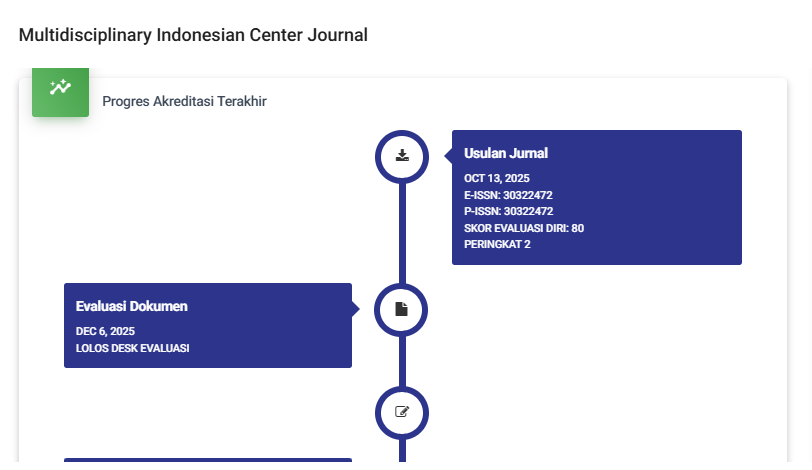THE URGENCY OF BELIEVING THE LAST VERSES OF SYAIKH NAJMUDDIN AL-KUBRA'S PERSPECTIVE (A STUDY OF THE INTERPRETATION OF TASAWUF AKHLAQI)
DOI:
https://doi.org/10.62567/micjo.v2i3.1141Keywords:
Hereafter, Tafsir, Shaykh Najmuddin al-Kubra.Abstract
The eschatological phenomenon which states that life in the world will end when death comes, so that those who experience death will be delivered to the afterlife, this becomes a theological basis for Muslims to be implied in their lives in the world, because the afterlife along with its fate or journey is a reflection of oneself in living life in the world. Examining the verses of the Qur'an that discuss the afterlife has relevance to the interpretation of Shaykh Najmuddin al-Kubra in the book of tafsīr at-ta'wīlāt an-najmiyyah which has a style of isyari or sufistic interpretation, so that understanding the verses about the afterlife becomes new knowledge that is applied and experienced using the heart. This research produces a discussion of the verses of the Qur'an that explain the afterlife, such as the explanation of the realm of barzakh (QSal-Mu'minun: 100), the Day of Judgment (QSibrahīm: 48), the realm of resurrection (QSar-Rūm: 56), Yaum al-Mīzān (QSal-A ʻraf : 8-9), Yaum al- Ḥisāb (QSal-Kahf: 49), Yaum at-Tagābun (QSat-Tagābun: 9), Yaum al-Aʻraf (QSal-Aʻraf: 46), hell (QSal-Baqarah: 24), and heaven (QSaz-Zumar: 73). Thus, this research concludes that the fate of a creature will be determined according to the good deeds carried during life in this world. If more good deeds are brought then the fate of life in the afterlife will be determined by Allah SWT, but conversely if there are more bad deeds brought then the fate of life in the afterlife will be a place cursed by Allah SWT.
Downloads
References
Al-Kubra, Najmudin. At-Ta'wilat An-Najmiyah Fi Tafsir Al-Isyari Al-Sufi, (Lebanon : Dar Al-Kutub Al-Ilmiah, 2009), Volume 1.
Al-Kubra, Najmudin. At-Ta'wilat An-Najmiyah Fi Tafsir Al-Isyari Al-Sufi, (Lebanon : Dar Al-Kutub Al-Ilmiah, 2009), Volume 2.
Al-Kubra, Najmudin. At-Ta'wilat An-Najmiyah Fi Tafsir Al-Isyari Al-Sufi, (Lebanon : Dar Al-Kutub Al-Ilmiah, 2009), Volume 3.
Al-Kubra, Najmudin. At-Ta'wilat An-Najmiyah Fi Tafsir Al-Isyari Al-Sufi, (Lebanon : Dar Al-Kutub Al-Ilmiah, 2009), Volume 4.
Al-Kubra, Najmudin. At-Ta'wilat An-Najmiyah Fi Tafsir Al-Isyari Al-Sufi, (Lebanon : Dar Al-Kutub Al-Ilmiah, 2009), Volume 5.
Arifin, Bey. Life After Death, (Jakarta: CV. Kinta, 1991).
Azhari, Novi Nurjannah. Peace of Heart in the Qur'an (Study of the Thought of Shaykh Najmuddin al-Kubro), (UIN Sunan Ampel Surabaya Thesis, 2019).
Damanhuri, Rokhim Hasan, Abdur. N, Abd. Muid. “Evidence of the Truth of the Qur'an Regarding the Resurrection on the Day of Judgment”, COMSERVA: Journal of Research and Community Service , 4.6 (2024).
Dzakirah, Hanifah. Fadhilah, Nurul. Falah, Hayanul. Lisa. Wismanto. "Belief in the Last Day from an Islamic Perspective", Ikhlas: Scientific Journal of Islamic Education, 2.1 ( 2025 ).
Filmizan, Nirwana AN, Andri. Rhain, Ainur. Dahliana, Yeti. Hidayat, Syamsul. “The Word Mīzān in the Perspective of Tafsir al-Mīzān and Its Implications for Educational Values (A Study of the Letters of ar-Rahman and al-Hadid)”, Jurnal al-Mau'izhoh , 6.1 (2024).
Habibie, Hebi. “The Concept of the Eternal Afterlife: A Comparison of Islamic and Christian Eschatology,” Sinthop: Media for Educational, Religious, Social, and Cultural Studies, 1.1 (2022).
Hafizh, Muhamad. Dzawafi, Agus Ali. “Theology of Mustadh'afin in Surat an-Nisa Verses 97 and 98 from the Perspective of Imam al-Alusi (Study of the Book of Tafsir Ruh al-Ma'ani)”, Jurnal al-Fath, 17.2 (2023).
K, H. Abdul Halim. “Heaven According to the Qur'an”, Istiqra Journal, 11.1 (2014).
Maharini, Rini. Safitri, Siti Salma. Khayrani, Silva. Fatimah, Siti Mutiara. “Harmonization Between the World and the Hereafter: A Critical Study of the Hustle Culture Phenomenon in Generation Z from the Perspective of the Qur'an”, KACA (Karunia Cahaya Allah): Dialogical Journal of Ushuluddin Sciences, 15.1 (2025).
Prayogo, Pandu. The Meaning of Ahsan Taqwim in the Qur'an (Comparative Study of Tafsir al Ta'wilat al Najmiyyah and Tafsir Ibn 'Arabi), (Thesis UIN Sunan Ampel Surabaya, 2023).
Rahayu, Sri Ulfa. Datmi, Muhammad Akbar Rosyidi. Siregar, Idris. “Resurrection and Mahsyar: The Perspective of the Qur'an and Hadith”, Ibn Abbas: Journal of Qur'anic Sciences and Tafsir , 5.1 (2022).
Razak, Nasrudin. Dinul Islam, (Bandung: Al-Ma'arif, 1996).
Rizqina, Kana. Interpretation of the Verses about Ḥisāb in Surah al-Isra' Verses 13-14 and al-Anbiya Verse 47 , (Thesis, UIN ar-Raniry Darussalam Banda Aceh, 2018).
Sari, Milya. Asmendri. 'Library Research in Science Education Research', Natural Science , 6.1 (2020).
Sarman. Semantics of Words Meaning Hell in the Qur'an from the Perspective of an Exegete , (Thesis of the PTIQ Institute Jakarta, 2021).
Sugiyono. Qualitative Research Methods and R & D (Bandung: Alfabeta, 2014).
Wahyudi, Agus. Heaven and Hell Are Not Eternal, (Yogyakarta: Diva Press, First Edition, 2011).
Yunarti, Sri. The Character of the Inhabitants of Hell (An Interpretation Study of Munir's Tafsir by Wahbah al-Zuhaili) , (Thesis UIN Mataram, 2022).
Downloads
Published
How to Cite
Issue
Section
License
Copyright (c) 2025 Rizal Ahmad Fauzi, Badrudin, Salim Rosyadi

This work is licensed under a Creative Commons Attribution-ShareAlike 4.0 International License.



























